Seven Vermont Women Upgrade Higher Education
Compiled by Rickey Gard Diamond
|
|
Quick Links

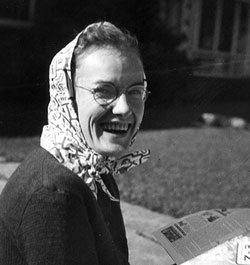
Evalyn Bates, Goddard Junior Collage
|
More women are graduating from college than are men for the first time in history. In 2003 the gender proportions of the 1960s were virtually reversed, with 1.35 females for every male who graduated from a four-year college and 1.3 females for every male undergraduate.
At the same time, college is becoming increasingly expensive. NPR recently reported that about two-thirds of bachelor's degree recipients borrow money to attend college. Collectively, student debt has topped $1 trillion.Experts blame the debt crisis in part on a combination of increases in tuition, and decreases in government support. At the end of June, Congress extended federally supported loan rates of 3.4 percent, but only for a year. The real battle will begin soon, post-election.
Meanwhile, Vermont's rate for placing women at the head of higher learning institutions closely aligns with what is happening nationally.More than a quarter of college presidents are now female, and more than a third lead two-year colleges. Six of Vermont's 23 colleges are now headed by women. These six formidable women presidents present a proud legacy of innovation and budgetary savvy worth examining.
Their gifts must include the story of a seventh near-forgotten woman, Evalyn Bates of Williamstown, whose educational designs influenced many Vermont colleges, making them more affordable and accessible. Roughly 40 percent of students today are "non-traditional," often working adults, and most often women. These were the students whose potential Bates saw. |

|
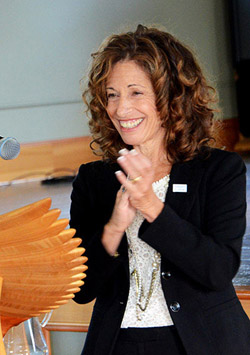
Barbara Vacarr, Goddard College |
Goddard College
Nationally known for its progressive contributions to educational history, Goddard College named Barbara Vacarr its tenth president in June, 2010. Vacarr believes that "telling a fuller story is part of the job of education," the reason why she made it one of her first tasks to honor the accomplishments of Evalyn Bates. Bates' story paints a vivid picture of women's education in an earlier time.
Bates attended Montpelier Seminary as a boarding student, with her tuition paid by produce and milk from the family farm, graduating in 1933. Her fraternal grandmother wanted someone in the family to graduate from UVM, so she paid for Evalyn's attendance. But after a year, Bates developed appendicitis and had to leave. (An older brother had already died of the Spanish Flu.)
She finished her second year at Goddard Junior College, located in Barre then, while living with her grandmother and aunt, acting as a mother's helper and nanny to her young cousin, in exchange for her board and room and tuition. She wouldn't graduate until 1936.
When Goddard reincarnated as a four-year college in Plainfield in 1938, Evalyn was among those who worked to get the new enterprise off the ground, while continuing her studies. In 1943, she was one of the first two baccalaureate graduates. Her senior study was "Two Projects in Adult Education." |
President of the new college, Tim Pitkin, in his commencement speech noted Bate's study had removed "the barriers that ordinarily separate school from real life. In a very real sense the social environment has been [her] laboratory." Bates became Pitkin's secretary and maintained a long professional relationship with the man who became her mentor and friend.
Bates went on to design The Adult Degree Program, the first "distance education" ever instituted, decades before computers made the term widespread. Bates' ideas about a low-residency model were ahead of her time; she oversaw the first residency in 1963. Vacarr says that Bate's approach changed education forever. It is why she felt it important to tell Bates' story.
ADP remains the mainstay of Goddard's education now, and its design has been adapted by other colleges, including Johnson State, Bennington College and Norwich Univ. programs at Vermont College, now become Vermont College of the Fine Arts. Vacarr launched Lesley University's Ph.D. program in the School of Education in 2006 as the epitome of her career that helped make Lesley a center for adult learning in the Boston area. Elements of Vacarr's work used Bates' design.
When Bates first began, however, she reported meeting with some initial resistance. "My recollection is that it took some prodding for [Tim Pitkin] to think about it," she laughed. "He wasn't too keen on the idea at first; he didn't understand its dimensions." By 1968, she took a sabbatical to study at Claremont Graduate School and Esalen Institute in California, formulating a master's program, based on the ADP model.
Yet it wasn't until Sept. of 2011 that Evalyn Bates' work became more widely recognized, appearing as part of an article about Goddard's surprising survival in The Chronicle of Higher Education.
This fall, Vacarr awarded Bates an honorary doctorate at a graduation event, saying, "In Evalyn's own words, 'Goddard was one of the few places that took seriously the idea that adult college students could make their own minds up about what they wanted to do.'
"This is what students have always had the freedom to do at Goddard," Vacarr went on. "However, this day is also about righting a wrong, about telling a woman's story that is long overdue, a story that has endured in silence….Evalyn's work…remains more educationally relevant today than ever before."
Sadly, Bates doctorate was awarded posthumously, but Dr. Vacarr's work, illuminating Bates' career and Goddard's lost history, brings this president closer to her broader goal of a more inclusionary educational narrative. |

|
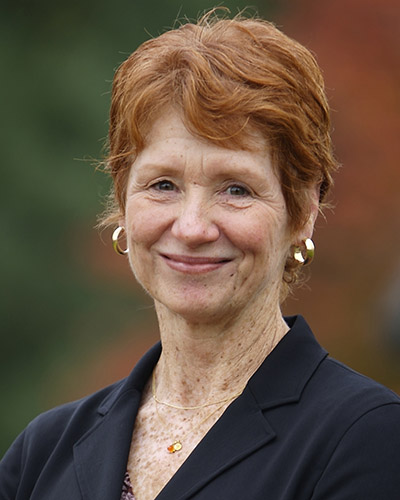
Barbara Murphy, Johnson State
|
Johnson State College
Johnson State's President, Barbara E. Murphy was recently recognized by the Labor of Love mentoring project of Vermont Works for Women (See Vermont Woman, Fall, 2012).
Murphy has been president of Johnson State College since 2001. Prior to that, she served at Community College of Vermont for 18 years, where she advanced from an academic advisor to academic dean and finally to president, a position which she held for six years. Her career has been dedicated to education—in many ways—starting as a VISTA volunteer in the mid-1970s; as someone who directed the Vermont Legal Aid taxpayer renter rebate program; as a director of after-school programming at the YMCA; and as part of a research team at the Univ. of Vermont who investigated successful outcomes for low birth-weight babies.
Public higher education is the door through which many Vermonters walk toward opportunity. Murphy has been a key player in the Vermont State Colleges since 1983. Even in her early days at Community College of Vermont, when she was an academic advisor, she piloted and developed a network of writing and skills support centers throughout the state to assist students who otherwise could not have succeeded in college.
|
| She was one of the first to drive home the point that students did not have 'a right to fail' but had instead 'a right to succeed.' This is by no means a subtle point. Once a college accepts its responsibility for helping students succeed, it must make vigorous efforts to take students from where they are academically, to where they can succeed and graduate. This is a value imbedded in both CCV and JSC because of Murphy's efforts." |

|
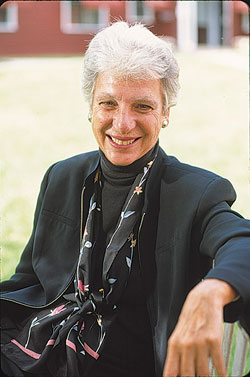
Elizabeth Coleman, Bennington College |
Bennington College
When you speak about budgets, it is hard to best Bennington College. Under the tenure of President Elizabeth Coleman, Bennington College actually reduced its tuition. Coleman has just announced her intention to retire on June 30, 2013, following her 25th year in office. Bennington's ninth president, Coleman is among the longest-serving college presidents in the country.
Alan Kornberg, chairman of the Board of Trustees, recently said: "It is hard not to understate the profound impact that President Coleman has had on this institution. Thanks to her courageous leadership, unwavering commitment to the founding values of the college and her pioneering vision for a liberal arts education, Bennington is stronger than ever."
Coleman's tenure coincides with Bennington's most significant period of growth in the College's 80-year history. Since her inauguration in 1987, the College has raised more than $175 million; six new buildings have been constructed, all of them award-winning.
Ninety percent of the campus has undergone substantial renovation. A concerted greening initiative included a conversion of the College's primary heating system from oil to wood chips. And applications for admission have doubled, bringing enrollment to an all-time high. |
Bennington is no longer the most expensive college in the country; 80 percent of its students receive institutional grants and scholarships, more than many top private colleges; and its students graduate with less debt than the national average.
Among the pioneering curricular programs launched are a top-ranked low-residency graduate program in writing and the ambitious Center for the Advancement of Public Action, which has garnered national attention. It invites students to put the world's most pressing problems at the center of their educations. As part of the transition, Coleman will serve as the first director of CAPA for two years upon the completion of this academic year.
A search for Coleman's successor is underway. In a recent letter to the Bennington College community, Coleman said: "Presiding over Bennington has been more than I had dared to dream—exhilarating, tumultuous, challenging, heady—and always, always about things that mattered, things that mattered a lot…."
Coleman's vision for the liberal arts and their role in reinvigorating society has been widely recognized. She speaks internationally on the topic, and concluded the 25th anniversary TED "Ideas worth Spreading" Conference in Los Angeles. You can view the video that has inspired many at www.ted.com and learn more about the ideas sparking her newly created public action center. |

|
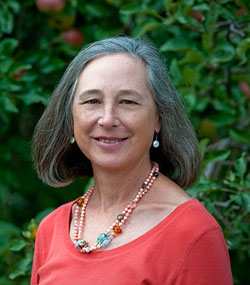
Ellen McCulloch-Lovell, Marlboro College |
Marlboro College
Ellen McCulloch-Lovell served seven years in the Clinton White House before she returned home to the Green Mountains as president of Marlboro College in 2004. Vermont Woman featured her on our August, 2004, cover.
McCulloch-Lovell's lifelong interest in art, politics, and education took root in Vermont in the 1960s. She earned her B.A. from Bennington College in 1969, majoring in philosophy. After earning a teaching certificate in a two-room elementary school in Fayston, she created the Artists-in-the-Schools program as Program Director of the Vt. Council on the Arts. Her work to increase federal and private funding for the Arts Council from 1970-1975, led to her serving as Executive Director for eight more years.
In 1983 she was named Chief of Staff for Senator Patrick Leahy, one of only 11 women in the position at the time. |
During the Clinton administration, she was named Executive Director of the President's Committee on the Arts and Humanities, and in 1997, became Deputy Chief of Staff to First Lady Hillary Rodham Clinton,
In her 2004 interview with Vermont Woman, McCulloch-Lovell laughed at her struggle to combine art with politics, and judging from a recent article she published in The Chronicle, her nimble balancing continues.
She wrote: "I am one of some 13 percent of college and university presidents who come from 'outside' the academy—a small percentage, but a growing number." She said a recent study found only 30 percent of deans and provosts aspire to a college presidency, having seen "the constant problem-solving and continual fund-raising that compete for a president's attention."
A leader who easily mediates between the larger environment and the world of higher education, she argued, may grow more important. "We understand that colleges and universities have, as the economist William J. Baumol said, 'the cost disease.' They are labor-intensive, handcrafted enterprises, in which it is hard to make up increased costs with increased efficiencies. But because we worked in other arenas, solving real-world problems, we see [education] in perspective….We bring with us a healthy impatience."
McCulloch-Lovell credits the complexity of what she calls "the whole living system" of a college. Her writing embodies this learning life, at once challenging and respecting the processes she oversees as President: "If we love learning itself and believe in our hearts, along with Thomas Jefferson, that 'an educated citizenry is a vital requisite for our survival as a free people,' then nontraditional presidents come with deep respect for the members of the faculty and, like our academic peers, pledge to uphold teaching and learning." |

|
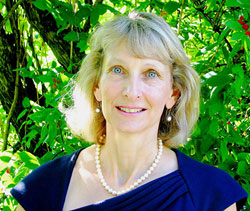
Christine Plunkett, Burlington College |
Burlington College
Christine Plunkett became President of Burlington College just this past June. She is successor to Jane Sanders, featured in SET ITAL Vermont Woman END in Jan. 2011. Plunkett is another one of those rare women, entering education from outside the field.
Plunkett graduated from the Univ. of Vermont with a Bachelor of Science degree in Business Administration and went on to earn her Master of Business Administration degree at Northeastern. A cost accountant at a Boston area manufacturing firm for several years, she also served as a member of the development team for VisiCalc software, a precursor to programs such as Excel. Plunkett also worked as an independent financial and software consultant in the greater Boston area for over 10 years. |
Burlington College's new president is not without educational experience. Plunkett held executive positions in secondary and higher education for over 13 years.. Prior to joining the staff at Burlington College in 2007, Plunkett was the Director of Finance and Operations at the Gailer School, a small, independent secondary school in Middlebury, where she also served as Interim Head of School from 2000-2002. She has also served as a trustee on the board of the Bridge School, an independent school also in Middlebury, and has taught in the adult education program at the Hannaford Career Center in Middlebury.
In 2010, Plunkett participated in a higher education leadership symposium at Southern New Hampshire Univ., focused on fundraising, board relations and finance. In 2011, she was one of 42 college cabinet members, nationwide, selected to participate in the year-long Executive Leadership Academy, co-sponsored by the American Academic Leadership Institute, American Association of State Colleges and Universities, and the Council of Independent Colleges.
The American Academic Leadership Institute (AALI), headquartered in Washington, DC, is a non-profit organization which works to strengthen academic leadership in all sectors of public and private higher education, including development of leadership talent. In the case of a young Burlington College, Plunkett's educational leadership will bring financial and technology expertise, vital to its development. |

|
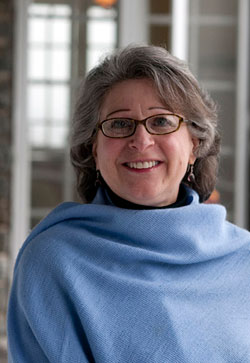
Karen Gross, Southern Vermont College |
Southern Vermont College
Southern Vermont College's President Karen Gross is in Washington D.C. on a year's leave at the U.S. Dept. of Education, serving as a Senior Policy Advisor. Her chief operating officer, James E. Beckwith, is acting president until her return in January, 2013. We conclude with Dr. Gross and her recognized expertise on the financing of education. Gross is concerned about the mounting levels of college debt.
Her national and international reputation as a scholar, teacher, administrator and community leader is rooted in her dedication to improving the lives of the less privileged. She has a special research interest in women and money and student debt loads. Her legal scholarly work has been published in leading law and education journals. Her prize-winning book, Failure and Forgiveness, was published by Yale Univ. Press.
A Phi Beta Kappa, Gross is also a cum laude graduate of Smith College and Temple Univ. School of Law. She spent her final year of law school at the Univ. of Chicago. Gross taught at the high school and college levels, while practicing law in Chicago and New York and then entered legal academia. |
She has testified before local and federal governmental bodies, most recently before the Vt. Higher Education Caucus, the Vt. House of Representatives Education Committee, the NYC Dept. of Consumer Affairs and the Federal Financial Literacy and Education Commission. She is the recipient of the 2002 New York State Bar Assoc. Pro Bono Service Award, the 2004 AAUW Education Foundation Senior Scholars Special Commendation of Honor and the Westchester Community College 2006 Women's History Month Honoree. In other words, like other Vermont women presidents, Gross excels at her work.
Southern Vermont College, though small, offers five academic divisions, Business, Humanities, Nursing, Science and Technology, and Social Sciences. Students combine classroom learning with real world experiences provided by internships and learn-by-doing projects.
Gross appeared in a summer story in The Boston Globe about the threatened loss of Pell funds. Currently 45 percent of Southern Vermont College students are eligible to receive Pell aid. "Any change would be significant for our overall budget,'' said Gross.
Pell grant reductions, as well as interest rate increases for student loans, would affect not just students, but the colleges that increasingly rely on federal financial programs in an era of dwindling state support— as is the case here in Vermont. Small private schools, like the ones five of these six women presidents head, would face an especially daunting future without Pell grants. It is clear the challenges all six women face are of heroic proportion—and that Vermont can look to them for innovation and leadership. |
|
|
| Compilled by Rickey Gard Diamond, Editor, Vermont Woman |
|